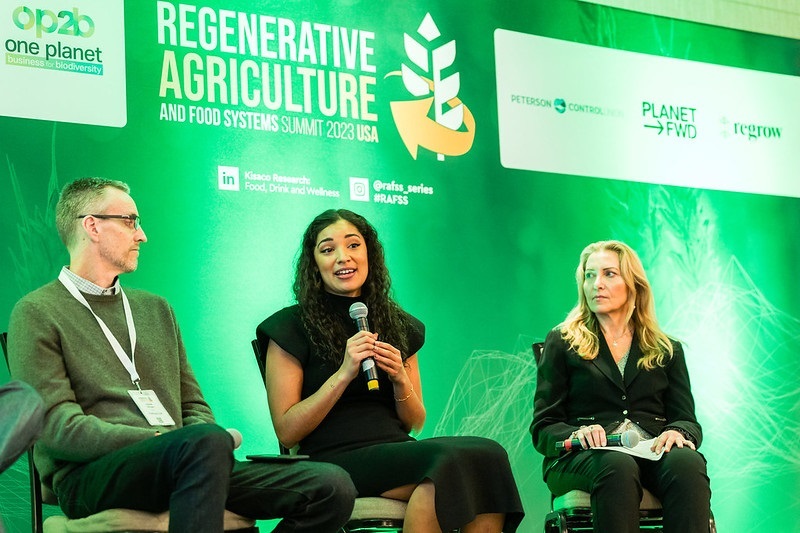Regenerative Agriculture and Food Systems Summit focused on accelerating the global transition to regenerative agriculture
In order to drive demand for foods produced using regenerative agriculture, consumers must be educated about the value of such foods and food retailers need to take a leadership role in working with brands to bring regenerative foods to market.
That was a key message of the Regenerative Agriculture and Food Systems Summit USA , held in March in Chicago. The two-day conference attracted 335 attendees, and 250 companies were represented. Attendees were a diverse group, ranging from organic farmers and non-profit groups to major food companies and pesticide suppliers.
The summit featured a wide range of panel discussions, including securing buy-in from farmers, standardizing regenerative ag approaches, financial solutions to incentivize the transition to regenerative ag, challenges, cross industry collaboration, and the role of retailers and consumers in the transition to regenerative agriculture, among others.
How to tell the story of regenerative to consumers
During a session titled “Unifying and Standardizing Regenerative Agriculture Approaches to Measure Progress,” several sustainability experts from major consumer packaged goods companies discussed the challenge of educating consumers about the benefits of regenerative agriculture.
Jess Newman, senior director of agriculture and sustainability at McCain Foods, asked: “What does standardization and verification mean to consumers? We are trying to figure out how to tell the story of regenerative to consumers that resonates.”
Kim Sundy, senior director of agriculture and sustainability at Kellogg Company, agreed: “We need more collaboration with customers and retailers to help us tell the story on shelf. It’s one of the biggest challenges.”
Jay Watson, senior manager, global impact initiatives at General Mills, said: “That’s the biggest challenge ahead of us. We need to create demand. It’s a tall order.”
Sundy also said that Gen Z consumers expect a message of sustainability attached to the food they buy.
“Retailers are the stage to amplify the work of the brands”
In the session, “Role of Retailers and Consumers in the Transition to Regenerative Agriculture,” Nova Sayers, vice president of growth and innovation at HowGood, Inc. , asked: “Why have food retailers been absent in this discussion? We need retailers to take a leadership role.”
Sayers cited several retailers that are taking steps to advance regenerative agriculture including Sprouts Farmers Market , Natural Grocers , and Wal-Mart as well as natural food distributer United Natural Foods.
Gabriel Morgan, CTO of Producers Trust , said retailers’ job is complicated. “I don’t think retailers know a lot about nutrient density. They rely on brands. There is a lack of trust in certifications. It’s up to the retailer to feel pressure from consumers.”
Kayalin Akens-Irby, head of growth at Planet FWD , said retailers have the most influence. “Retailers are the stage to amplify the work of the brands,” she said. “We can create a win-win situations between retailers and brands.”
Akens-Irby She cited the example of Moonshot Snacks in its efforts to communicate a regenerative message to consumers. They changed packaging 12 times, trying different messages that appealed to consumers. They settled on a message of regenerative agriculture helping to mitigate climate change and improve soil health and the lives of farmers.
“That messaging worked,” she said. “Tell consumers that regenerative agriculture fights climate change; it’s a message that connects.”
John Kempf, founder & CVO of Advancing Eco Agriculture , emphasized that regenerative agriculture can produce nutrient-dense foods, a message that can also connect with consumers.
“We can have dramatic impact on public health. Close to 50% of all adults are predicted to have cancer. Why would we consider that to be acceptable? We can have a preventative impact on health,” he said.
Kemf cited the research on nutrient density that has been done by France-based association Bleu Blanc Coeur and the Bionutrient Food Association .









